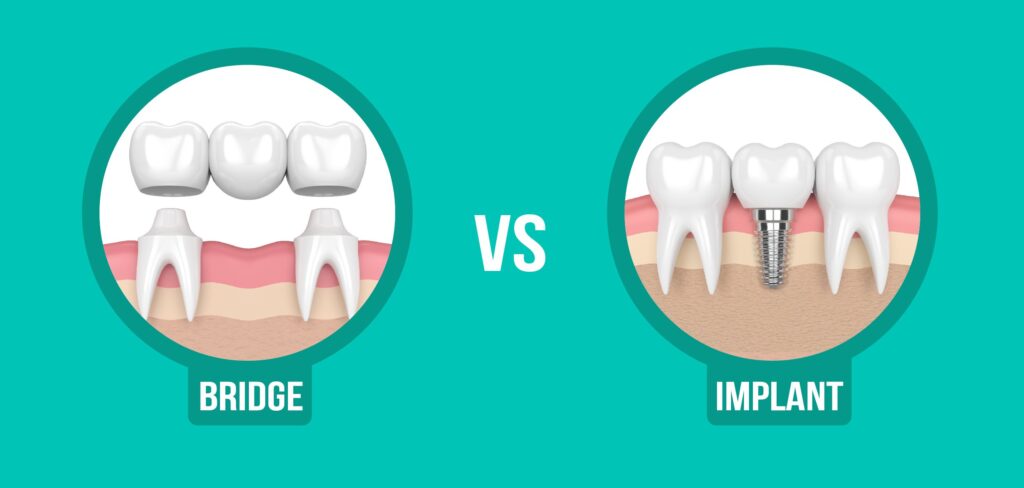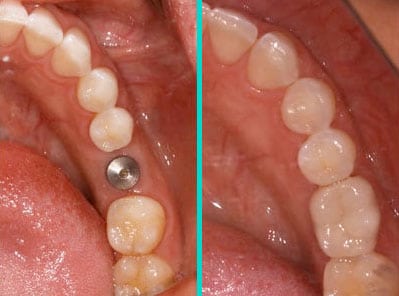Missing Teeth? Compare Dental Implants and Bridges to Restore Your Smile

When faced with tooth loss or extraction, restoring functionality and appearance becomes a top priority. Missing teeth can affect not only your ability to chew and speak but also your self-esteem. Two popular options for replacing missing teeth are dental implants and dental bridges. While both provide similar outcomes, they differ significantly in terms of procedure, durability, and cost. Let’s explore these options in depth to help you make an informed decision.
Know the Dental Implant vs Dental Bridge for Better Understanding.
What is a Dental Implant?
A dental implant is a titanium post surgically inserted into the jawbone to act as a tooth root. Over 3 to 6 months, the implant fuses with the jawbone through osseointegration. Once this is complete, an abutment is attached to the implant, providing a base for the crown, miming the appearance and function of a natural tooth.
Pros of Dental Implants:
Natural Appearance and Functionality: Dental implants look, feel, and function like natural teeth. High-quality crowns, such as E-max Zirconia, enhance their aesthetic appeal.

Protects Jawbone Health: Implants stimulate the jawbone, preventing bone loss that commonly occurs in areas of missing teeth. This helps maintain facial structure and overall oral health.
Preserves Adjacent Teeth: Unlike bridges, implants do not rely on neighboring teeth for support. This helps preserve the integrity of surrounding teeth.
Long-Lasting Solution: With proper care, dental implants can last a lifetime. They require minimal maintenance, such as regular flossing and using a water flosser.
Cons of Dental Implants:
- Surgical Procedure Required: Dental implant placement involves surgery, which carries minor risks. However, advancements like 3D CBCT scans have significantly reduced complications.
- Longer Treatment Time: Osseointegration takes 3-6 months, making the process longer. Temporary crowns can be used during this period.
- Higher Initial Cost: Implants are more expensive upfront, but their longevity often makes them cost-effective in the long term.
What are Dental Bridges?
Dental bridges are prosthetic devices used to “bridge” the gap created by one or more missing teeth. They consist of crowns placed on adjacent natural teeth (abutment teeth) with a false tooth (pontic) in between.
Pros of Dental Bridges:
- Quicker Process: Unlike implants, bridges can be completed within 1-2 weeks.
- Non-Surgical Option: Bridges do not require surgery, making them a simpler choice, especially for patients with health conditions that contraindicate surgery.
- Suitable for Certain Health Conditions: Bridges are ideal for patients with conditions such as osteoporosis, bleeding disorders, or those undergoing cancer treatment.
Cons of Dental Bridges:
- Impact on Adjacent Teeth: Supporting teeth need to be reduced to accommodate crowns, potentially weakening them.
- Bone Loss: Bridges do not stimulate the jawbone, leading to bone loss in the area of the missing tooth.
- Higher Maintenance: Cleaning under the bridge requires special floss and additional care to prevent gum disease and decay.
- Limited Longevity: Bridges typically last 4-7 years before requiring replacement, especially if adjacent teeth are compromised.
Cost Comparison: Implants vs. Bridges
- Dental Implants: Starting at ₹20,000 per implant. Though initially expensive, implants often prove more economical over time due to their durability.
- Dental Bridges: Starting at ₹9,000. While more affordable initially, the need for periodic replacement can increase long-term costs.
Note: Neither implants nor bridges are typically covered by health insurance in India. Check with your provider for details.
Which Option Should You Choose?
The decision between dental implants and bridges depends on factors such as:
- Overall Health: Implants may not be suitable for patients with certain medical conditions.
- Time and Budget: Bridges are faster and less expensive initially, while implants offer long-term benefits.
- Bone Health: Implants are the better choice if preserving jawbone density is a priority.
Both options have their advantages and limitations. For personalized guidance, schedule a consultation with your dentist to determine the best solution for your specific needs.
If you have further questions or wish to explore these options in detail for Dental Implant vs. dental Bridge, please contact our clinic. We are here to help you restore your smile and confidence!
